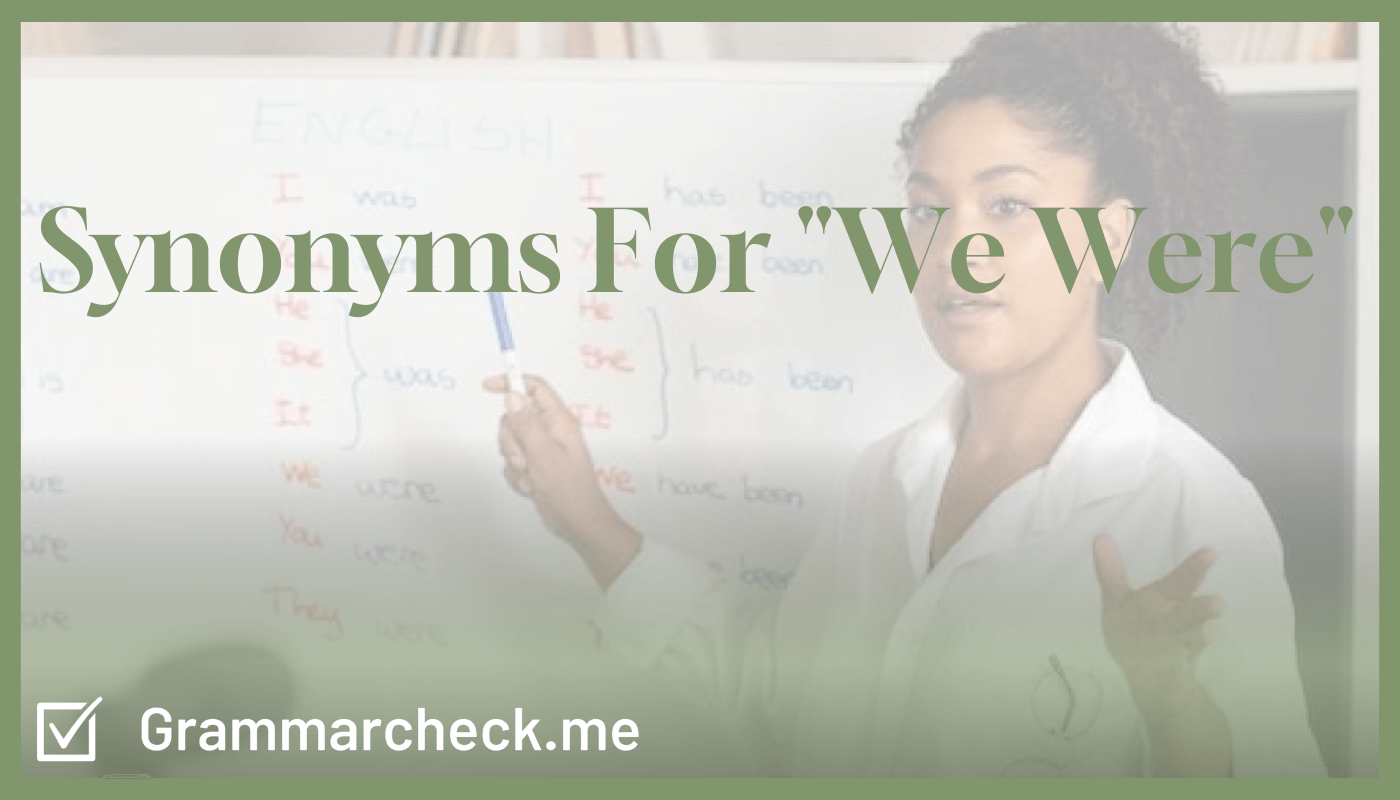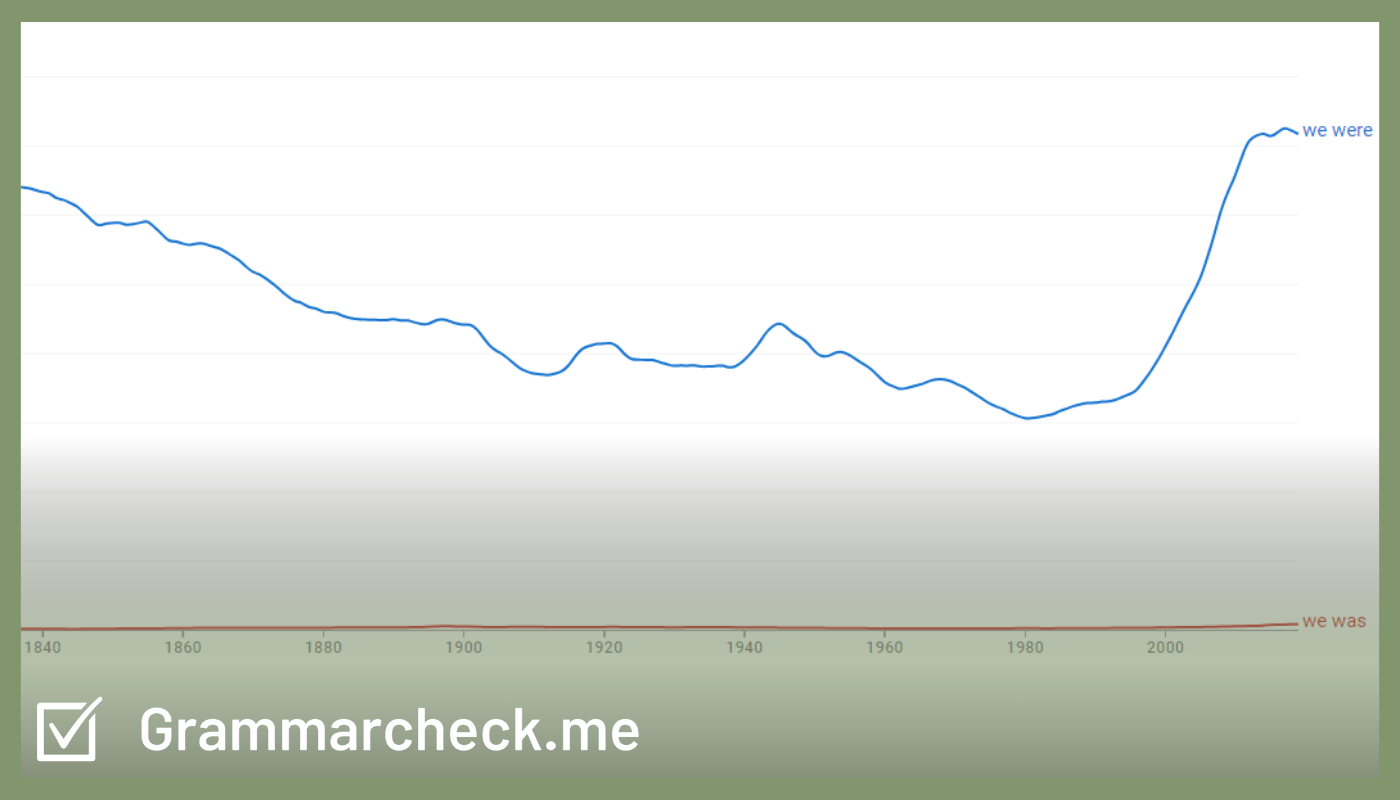“We were” is correct choice when trying to use the 1st person plural version of the verb “to be” in the past simple tense . “We was” is not proper English but is used in certain regions of the US.
The phrase “we were” can be used in many different past tense contexts. It can be used in situations such as storytelling, recounting events, or discussing historical situations. “We was” should not be used in formal writing or speaking contexts.
In this post, we’ll dive deeper into the definition of “we were”, show sentence examples, and common synonyms that can be used!

Which Is Correct: “We Were” or “We Was”?
“We were” is the grammatically correct form in the English language as the past tense of the verb “to be.” Although you may have heard it spoken in casual conversation, the phrase “we was” is not grammatically correct under standard English language rules.
The expression “we were” is used to refer to actions or conditions that occurred in the past. For example, we turned the air conditioning off last night because we were cold.
When Should “We Were” Be Used?
The phrase “we were” should be used to describe actions, conditions, or states that happened in the past. “We” is the subject that represents wither a group of people or things.
This phrase can be used in various contexts as the past tense form of the verb “to be.” For example, “We were at the conference last week.” This sentence indicates that a group of people attended a conference in the past (last week).
The expression “we were” is commonly used in the following contexts.
- Storytelling
- Recounting events
- Discussing historical situations
When Should “We Was” Be Used?
The phrase “we was” is not considered to be proper grammar and should not be used in any formal writing context.
However, “we was” has historically been used as an acceptable form of a local or regional dialect. It was originally used by British working-class people as a slang version of “we were”. Although “we was” is not one of the correct past tense forms of “we were”, it has historically been used in various literary works, including classics like “Lord of the Flies” by William Golding and “The Adventures of Tom Sawyer” by Mark Twain.
What Are Synonyms For “We Were”?
Below are 10 synonyms for “we were”.
- We existed as. Used to emphasize the state of existence in the past.
- We used to be. Used to describe a previous condition or state.
- We had been. Indicates a past state or action that occurred before another past event.
- We stood as. Emphasizes the position or role in the past.
- We acted as. Applicable when highlighting a specific role in the past.
- We lived as. Used to describe a past way of life.
- We functioned as. Suitable for expressing a previous role.
- We played the part of. Indicates a role or character portrayal in the past.
- We served as. Emphasizes the function in the past.
- We operated as. Appropriate when describing a past mode of operation or function.

These synonyms can be used to convey the same or similar meanings as “we were,” depending on the specific context and the nuances you want to emphasize in your writing or conversation. Just like we saw in our post about I would love to synonyms, they can be very effective to getting the appropriate vocabulary for the correct context.
How Do You Use “We Were” In A Sentence?
Below are 5 examples of how to use “we were” correctly in a sentence.
- Last summer, we were fortunate enough to visit the Grand Canyon and witness its breathtaking beauty.
- During the meeting, we were discussing the upcoming project and assigning tasks to team members.
- When we were in college, we were inseparable, and we shared countless adventures together.
- As children, we were always excited when we were told it was time for a family road trip.
- In the past, we were hesitant to embrace new technologies, but now we can’t imagine life without our smartphones.
Popularity Analysis
The diagram below is a popularity analysis of the expressions “we was” vs “we were”. Google’s own Ngram data shows that “we were” is used far more commonly than “we was”. This is because “we were” is the grammatically correct first person plural of “to be” (past simple tense). However, “we was” is used in some parts of the country as a local dialect. But just like we saw in our analysis of the phrase “slow is smooth“, even incorract grammar expressions can gain popularity.

Are There Common Grammar Mistakes For The Phrase “We Were”?
Yes, there are common grammar and spelling mistakes associated with the phrase “we were.” Some of these mistakes include:
- Subject-Verb Agreement: One common mistake is using the incorrect verb form with “we.” For example, saying “we was” instead of “we were” is a subject-verb agreement error.
- Homophones: Confusion with homophones like “we’re” (contraction of “we are”) and “were” can lead to incorrect usage.
- Spelling Errors: Simple spelling mistakes, such as omitting the “e” in “were,” can occur.
- Tense Confusion: In some cases, people may mix tenses, using “we were” in a sentence where another tense is required, leading to grammatical errors.
- Incomplete Sentences: Failing to complete a sentence that begins with “we were” can result in grammatically incorrect fragments.
To avoid these mistakes, it’s essential to pay attention to subject-verb agreement, select the correct word (e.g., “were” vs. “we’re”), and ensure that the tense and structure of the sentence are appropriate for the context. Proofreading and careful editing can help eliminate these common err
Frequently Asked Questions
The phrase “we was” appears in literary works such as “The Adventures of Tom Sawyer” by Mark Twain, where it reflects the use of regional dialects to portray specific characters and settings.
Local dialects can affect grammar rules by introducing variations in language usage, including pronunciation, vocabulary, and grammatical structures, which may differ from standard or formal language. These dialects often reflect the unique linguistic characteristics of specific regions or communities.
The Bottom Line
By now you should be an expert on the difference between “we was” and “we were”. The expression “we were” is the grammatically correct choice if you are trying to use the past tense first person plural of “to be”. A singular subject must be used in order to pair with the word “was”. Consider using our own grammar checking tool if you need more help with grammar rules like this!
